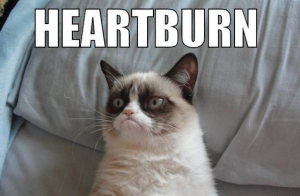 You’ve just finished a delicious meal, but instead of feeling satisfied, you’re very uncomfortable — there’s a burning sensation in your stomach moving up toward your chest and throat, and it may get worse when you lie down. What’s going on? It’s a feeling you might know all too well. It’s Acid reflux. Did you know that acid reflux affects more than 6o million Americans at least once a month?
You’ve just finished a delicious meal, but instead of feeling satisfied, you’re very uncomfortable — there’s a burning sensation in your stomach moving up toward your chest and throat, and it may get worse when you lie down. What’s going on? It’s a feeling you might know all too well. It’s Acid reflux. Did you know that acid reflux affects more than 6o million Americans at least once a month?
Acid reflux refers to the symptoms you feel when acids in your stomach flow back into the esophagus. This backward movement of stomach acid is called reflux. The acid can burn and irritate the esophagus, throat, and vocal cords. That’s where it gets its lovely nickname, Heartburn. Heartburn is a common problem and despite its name, it has nothing to do with the heart.
When you have heartburn often, you may have a condition called gastroesophageal reflux disease, or GERD. It is important to get treatment for frequent heartburn, because a small percentage of people with GERD will develop changes in the lining of the esophagus called Barrett’s esophagus.
How does heartburn happen?
At the bottom of the esophagus there is a ring of muscle called a sphincter. It acts like a valve. When you swallow food, the sphincter opens to let the food pass into the stomach. The ring then closes to keep the stomach contents from going back into the esophagus. If the sphincter is weak or too relaxed, stomach acid and food flow backward into the esophagus. Because the esophagus does not have the protective lining that the stomach has, the acid causes pain and irritation.
What are the symptoms of acid reflux?
The main symptom of acid reflux is a burning pain in the lower chest, usually close to the bottom of the breastbone. Other symptoms include:
-
acid or sour taste in your mouth
-
belching
-
a feeling of bloating or fullness in the stomach.
When do symptoms typically occur?
- After very large meals
- 30 to 60 minutes after you eat
- Bending or lifting after meals
- Wearing tight clothing
- When you lie down after eating
What makes heartburn worse?
Certain foods can make the symptoms of acid reflux worse. You can ease symptoms by avoiding:
- Citrus fruits
- Chocolate
- Caffeinated drinks or alcohol
- Spicy, fatty, or fried foods
- Garlic and onions
- Peppermint
- Tomatoes
How is heartburn diagnosed and what is the treatment?
The diagnosis begins with a complete history and physical examination. In many cases that provides enough information for the doctor to make the diagnosis and begin a treatment plan. In some instances, further testing may be required:
X-ray: The patient may be asked to swallow barium or Gastrografin (two types of contrast materials) while a radiologist, using an X-ray or fluoroscopy machine, watches the contrast material travel down the esophagus and enter into the stomach. Aside from looking for irregularities or inflammation within the esophagus and of the esophageal walls, this test can determine if the esophagus muscles are working properly in a rhythmic fashion to push the contrast material into the stomach.
Endoscopy: In this test a gastroenterologist uses a flexible scope and with a fiberoptic camera to look at the lining of the esophagus and stomach. Inflammation and ulcers can be identified. Biopsies and small bits of tissue can be obtained to look for cancerous or pre-cancerous cells.
Watching your diet is far and away the best treatment for heartburn. Removing all reflux triggers and eating moderately and slowly, which allows food to digest and send signals to your brain that you are full – will help lessen or even eliminate heartburn.
Over the counter antacids can help if you are already experiencing heartburn. If you experience persistent heartburn, make sure to ask your doctor about possible alternatives, including prescription medications or surgical correction (only as a last resort).
If you are having problems with persistant heart burn and at home remedies just aren’t cutting it visit your local Coastal Urgent Care.
